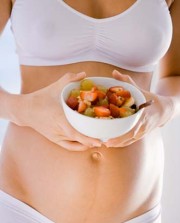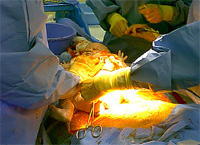What Minerals and Vitamins are essential During Pregnancy
 The foods that you eat and the nutrition that you take in while you are pregnant is going to have an effect on the development of your baby. A balanced diet is the best way to receive nutrients, but prenatal vitamins do also have a place in ensuring that you are getting the minerals and vitamins you and your baby need.
Prenatal vitamins will never replace a healthy diet, but rather assist you in ensuring that you get that little bit of extra help – simply put, they are a supplement and not a replacement.
According to the American College of Obstetricians and Gynecologists a pregnant women should increase their usual servings of a variety of foods from five basic food groups to include the following:
The foods that you eat and the nutrition that you take in while you are pregnant is going to have an effect on the development of your baby. A balanced diet is the best way to receive nutrients, but prenatal vitamins do also have a place in ensuring that you are getting the minerals and vitamins you and your baby need.
Prenatal vitamins will never replace a healthy diet, but rather assist you in ensuring that you get that little bit of extra help – simply put, they are a supplement and not a replacement.
According to the American College of Obstetricians and Gynecologists a pregnant women should increase their usual servings of a variety of foods from five basic food groups to include the following:
- Three to four servings of fruits and vegetables
- Nine servings of whole-grain or enriched bread, cereal, rice, or pasta for energy
- Three servings of milk, yogurt, and cheese for calcium
- Three servings of meat, poultry, fish, eggs, nuts, dried beans, and peas for protein
What you need, Why you need it and where to find it
| Vitamin/Mineral: (How Much/day) | Why You Need It: | Best Sources To Find It: |
|---|---|---|
| Vitamin A & Beta Carotene (700 mcg) | Development of bones and teeth grow | Liver, milk, eggs, carrots, spinach, green and yellow vegetables, broccoli, potatoes, pumpkin, yellow fruits, cantaloupe |
| Vitamin D (5 mcg) | Helps body use calcium and phosphorus; promotes strong teeth and bones | Milk, fatty fish |
| Vitamin E (15 mg) | Helps body form and use red blood cells and muscles | Vegetable oil, wheat germ, nuts, spinach, fortified cereals |
| Vitamin C (80 – 85 mg) | An antioxidant that protects tissues from damage and helps body absorb iron; builds healthy immune system | Citrus fruits, bell peppers, green beans, strawberries, papaya, potatoes, broccoli, tomatoes |
| Thiamin/B1 (1.4 mg) | Raises energy level and regulates nervous system | Whole grain, fortified cereals, wheat germ, organ meats, eggs, rice, pasta, berries, nuts, legumes, pork |
| Riboflavin/B2 (1.4 mg) | Maintains energy, good eyesight, healthy skin | Meats, poultry, fish, dairy products, fortified cereals, eggs |
| Niacin/B3 (18 mg) | Promotes healthy skin, nerves and digestion | High-protein foods, fortified cereals and breads, meats, fish, milk, eggs, peanuts |
| Pyridoxine/B6 (1.9 mg) | Helps form red blood cells; helps with morning sickness | Chicken, fish, liver, pork, eggs, soybeans, carrots, cabbage, cantaloupe, peas, spinach, wheat germ, sunflower seeds, bananas, beans, broccoli, brown rice, oats, bran, peanuts,walnuts |
| Folic Acid/Folate (600 mcg) | Helps support the placenta, and prevents spina bifida and other neural tube defects | Oranges, orange juice, strawberries, green leafy vegetables, spinach, beets, broccoli, cauliflower, fortified cereals, peas, pasta, beans, nuts |
| Calcium (1,000 – 1,300 mg) | Creates strong bones and teeth, helps prevent blood clots, helps muscles and nerves function | Yogurt, milk, cheddar cheese, calcium-fortified foods like soy milk, juices, breads, cereals, dark green leafy vegetables, canned fish with bones |
| Iron (27 mg) | Helps in the production of hemoglobin; prevents anemia, low birth weight, and premature birth | Beef, pork, dried beans, spinach, dried fruits, wheat germ, oatmeal or grains fortified with iron |
| Protein (60 mg) | Helps in the production of amino acids; repairs cells | Most animal foods, meat, poultry, eggs, dairy products, veggie burgers, beans, legumes, nuts |
| Zinc (11-12 mg) | Helps produce insulin and enzymes | Red meats, poultry, beans, nuts, whole grains, fortified cereals, oysters, dairy products |
Essential Minerals and Vitamins



